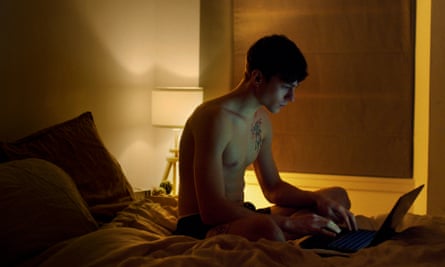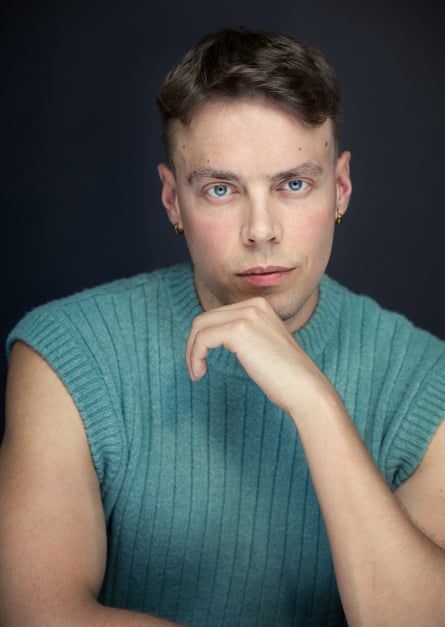Growing up in a small Finnish town close to the Russian border, Mikko Mäkelä knew he was gay from the age of 11. “I think I was happy until then,” says the shy 36-year-old, whose slippery second film Sebastian is about to be released. Isolated he may have been, but at least the young Mäkelä had movies. Alone in his room, he watched queer gems such as Mysterious Skin, Presque Rien and Beautiful Thing, keeping the volume low in case his parents heard. Then a trip to the cinema to see Brokeback Mountain changed everything.
“When I got home, they asked me, ‘Did you like that film?’ They had read about it and wanted to make sure I wasn’t like the characters. That was the night I ended up coming out to them.” He didn’t stay in Finland much longer, movingNottingham to attend university. “My home town felt extremely homophobic, which was a big part of why I left. I told myself that when I stepped off the plane in the UK, I’d stop lying.”
Mäkelä is dressed in a black hoodie, with a ring in each ear, and we are sitting in a crowded cafe near his home in east London. He discusses his upbringing willingly. Only later do I have the nagging feeling that a big piece of the puzzle is missing. When we reconnect by video call a few weeks later, he is in a Lyon hotel and seems breezier and less guarded than in the cafe, where we were elbow-to-elbow with strangers. Now feels like a better time to ask how his parents reacted to him coming out.
“Oh, badly,” he snorts. “Very badly. They were religious. My mum still is but we’re on good terms. My dad has passed away now. They tried to make me engage with gay conversion. I played along for a little bit, but ultimately realised it wasn’t going to work. That was why I had to put some distance between myself and my family.”
His parents insisted on keeping his sexuality secret from his siblings. “They wanted to hide it from everyone. I was sent to a psychologist, who actually sided with me. Then I was driven to an evangelical prayer-and-healing group. When the priest asked me what I felt was the matter with me, I told him, ‘Nothing.’ My parents weren’t too pleased about that. They also tried to make me join them in prayer, to purge me of these thoughts. There was so much pressure.”
But the horse had long since bolted, leaving the stable door in tatters. Mäkelä had been writing erotic stories, one of which he had posted online. This was bought by the Finnish porn magazine Kalle, which set aside a few pages for gay material. Mäkelä has never seen a physical copy of that issue, declined to have one sent to his home in case his parents found it, was too embarrassed to flick through it in a shop, and doesn’t know if it’s available now. “It might be,” he says, then dashes my hope of reading it. “It’s in Finnish, though.” What was it about? “The standard romantic fantasy of a horny teenager in a small town.”

Mäkelä’s short-lived career in erotica is pertinent to Sebastian. The film concerns Max, a young literary journalist in London who moonlights as a sex worker as research for his debut novel, only to discover that he enjoys it. As the picture begins, Max, played by Ruaridh Mollica, is already well into this unorthodox research for the book, which is titled Sebastian after the alias he goes by when charging for his charms.
When we first meet Max, a middle-aged client is inviting him to “tell me about yourself”. This idea of finding oneself through the stories we tell is pursued right through to the end of the movie, when Max goes directly from an afternoon assignation to a promotional Q&A at Foyles. He has continued to work his second job – one plus being that he doesn’t have to give 15% to his agent.

At the bookshop, Max tells his interviewer: “You can ask me anything.” Talking to Mäkelä, then, is a faintly meta experience. Here I am, trying to discover what first-hand knowledge he has, if any, of sex work, all while we pick over a film that ponders whether an artist’s personal life is any of his audience’s business. As Max’s mother tells him after reading one of his stories: “You do have the right to keep some things just for yourself.”
How much will Mäkelä keep for himself? He is not about to deny that his movies flirt with autofiction. In his recent short Nothing Special, a director is told: “I really liked your film but I wish it had a different ending.” Mäkelä heard the same remark from some audience members after the equivocal conclusion of A Moment in the Reeds, his 2017 debut about an affair between a Finnish academic and the Syrian builder renovating his father’s home. He has also given the hero of Sebastian some of his own characteristics: he’s an outsider who lives in east London, works as a journalist (as Mäkelä briefly did), writes erotic fiction and has a name beginning with M.
Mäkelä assures me that he has neither paid for sex nor been paid for it. His interest in the subject came after arriving in London, where he noticed that some of his peers were earning money from sex. “You’d hear things like, ‘Oh, someone offered me money on Grindr and I needed the cash,’” he says. “The digitalisation of our lives has lowered the threshold for entering sex work. It’s no longer associated with renting a room above a shop. I was surprised to see how commonplace it had become among queer students and creatives in east London. What was striking was the sense of freedom it gave people to explore their sexuality.”
To hear Max outlining his novel to a prospective publisher feels rather like listening to Mäkelä discussing the film. “I don’t want it to be another tragic sex-worker story,” Max says. Mäkelä had much the same objective. We might fear at times for Max’s wellbeing, especially when a client angrily discovers he has been fictionalising their encounters for his book, but events stop short of outright disaster.
The movie’s most radical aspect, though, is its treatment of the ageing and elderly body. Whereas rent-boy movies such as My Own Private Idaho and Johns are squeamish, even ageist, in their view of the men who pay for sex, Sebastian deals in equal-opportunity eroticism. Max relishes the sex he has with much older men, while the camera duly regards their bodies without the customary wariness or revulsion.

These older cast members may not have been invited to disrobe on-screen in decades, if at all, and the chance might never come again. “One of the actors did say they hadn’t been naked on screen before,” Mäkelä confirms. “I specified in the screenplay that we should see young skin touching older skin. I wanted to emphasise the poetry in those images. I thought that would be a beautiful thing to show.” It is only during Max’s interactions with men his own age, when no cash is changing hands, that he radiates awkwardness or inauthenticity. “It’s not a porno!” says one partner in response to his over-eager technique.
Andrew Haigh, the director of All Of Us Strangers who made his debut with 2009’s rent-boy documentary Greek Pete, observed recently that there are overlaps between sex work and directing: “You’re trying to make the thing that works for people and makes them feel something,” he told me. Does Mäkelä share that view? “It’s an interesting one. I remember being surprised by how fully some sex workers had outlined all the possible questions and answers on their websites so clients knew what to expect.” Not unlike a film-maker reassuring nervous financiers, then. “That’s true. And their websites all have reviews and star ratings, too.” Another similarity. “Yes,” he says coolly. “It’s like a Letterboxd for sex workers.”
Source: theguardian.com


